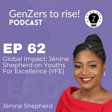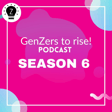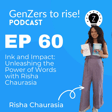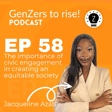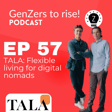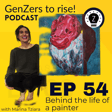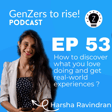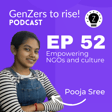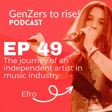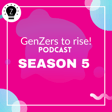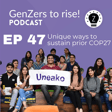Introduction to ZenCastor and its advantages
00:00:03
Speaker
Want to start your own podcast and not know where to start? Well, ZenCastor makes the process quick and painless. They provide crystal clear sound and gorgeous HD video. Not to mention there is no downloading required. Just click and start recording.
Why ZenCastor over Zoom?
00:00:21
Speaker
What about when you need to record remotely like we do with our podcast? Well, we started this podcast by using Zoom and we quickly found out that Zoom isn't great when it comes to podcasting. This is where Zincaster comes to play its role.
ZenCastor's features and discounts
00:00:33
Speaker
Zincaster is all about making your podcasting experience easy and with everything from local recording to automatic post-productions in the tool, you don't have to leave your browser to get the episode done. Start using Zincaster today for free and upgrade to the premium version whenever you're ready.
00:00:48
Speaker
There's no regular commitment and no hidden fees. If you go to zincaster.com slash pricing and enter the promo, Gen Zers to Rise Zero, you'll get 30% off your first three months. That's Z-E-N dot A-I slash Gen Zers to Rise Zero. It's time to share your story.
Changemaker-Z: Empowering Gen-Z entrepreneurs
00:01:08
Speaker
Hello, everyone. I'm Kennedy. And I'm Vasiles.
00:01:12
Speaker
We run Changemaker-Z, a student-run initiative that aims to empower, educate, and connect Gen-Zers interested in entrepreneurship. We interview teenagers with impactful projects and create resources to help you change the world. If they can't do it, so can you. On this podcast, we discuss the logistics of creating different types of projects with Gen-Zers who have already done it. We will leave our social media and website information in the description.
00:01:53
Speaker
Hello, changemakers.
Macrame artist Macy Levon and her journey
00:01:54
Speaker
In today's episode, we are meeting with McCrame artist, Macy Levon, to learn about her journey and her company, the Twistery. Welcome to the show. It's so nice to meet you. Well, thank you for having me. It's nice to meet you guys, too.
00:02:07
Speaker
Yes. So guys, me and Macy actually know each other. This is our, this is the first guest that we've had that I've actually kind of known the artist. You know, I kind of saw her artwork on Instagram, I think from a friend. I don't remember the first time I saw it. I was like, I think it was a couple of years ago. And I was like, this is amazing. She has her own company. So Macy, can you tell us a little bit about yourself and you know, how you got started with your prom egg?
00:02:33
Speaker
Yeah. Um, so like a lot of artists now there's, I started with COVID. So I was junior year of high school and school got closed down and suddenly I had a ton of time to film. So I decided I was gonna, I don't know, pick up a new project and I decided macrame would be perfect because I had a ton of plants in my bedroom and I wanted to fill the space really well and change that up. And so,
00:02:59
Speaker
I made a couple of plant hangers and after that I realized I really liked macrame and I worked on it more and more. I made a ton of things and I had run my dad's Etsy business for a while. So I knew how to run a business already and kind of just put my artistry along with my business skills together. And then June of 2020, I started my business and yeah, it's been growing fairly quickly since then I've grown a
00:03:27
Speaker
fairly large amount of Instagram followers and sold in a ton of stores in the Twin Cities and around the country and lots of art fairs and yeah, things are very big and I have my own studio now. So there's just a lot of pieces that have come together really quickly that make it very exciting. So yeah.
The macrame revival and Macy's designs
00:03:44
Speaker
That's so amazing, like, it reminds me of how it got started also during COVID and this was an important period I think for everyone. It was the worst period for people and the best period for people. Like, it's a very strange theme of things. But for people who don't know what exactly is macrame and what kind of things can you make with it, would you like to share some information? Yeah, so...
00:04:14
Speaker
Macrame is a form of knot tying and so it was really popular in the 70s and then it's gaining quite a bit of popularity now. You can find it in a lot of big stores like Target or Michaels and it's coming back really popular. But yeah, I take a thick cord and I tie it into little knots and various designs and patterns and I make like wall hangings or plant hangers and I do earrings and keychains. I do a ton of stuff, but yeah, it's beautiful.
00:04:43
Speaker
I made little earrings out of it. I know they're not super suitable, but yeah. It's such a unique piece. You can hang up in your house. Like, especially if you like that, like bohemian, that's where my, like bohemian kind of look accents are all, but yeah. And I'm curious to learn, do you have a favorite item to make? Um, I think my favorite thing to make is wall hangings just because with those I can
00:05:10
Speaker
They give me a lot more creativity. A lot of my products, it's the same thing over and over, but when I do wall pieces, they're really big and I can make it up as I go or I can just really change because it's such large scale. I can change the pattern and just have a lot of fun with my creativity in that. I don't make a ton of them because they take a long time, but it is fun when I do have the time to make them just to be able to like let my creativity flow instead of having like a set thing I have to make.
00:05:39
Speaker
That's so funny that you brought that up because literally I was gonna ask like how long did you because you vary from I know you have these cute little rainbows into the earrings like but you know you vary from like how long did it take to make kind of a smaller thing to like maybe your biggest piece like the wall hangings. Yeah, it because it's all handmade. Mm hmm. Yeah, I am everything and the thing about macrame is you can't order it from a producer like I can't get prints of something everything has to be handmade. So
00:06:07
Speaker
Keychains and earrings, which are my smallest things, probably take, it's hard because I batch produce them, so I never know exactly how long one is, but keychains probably take an hour tops, probably less, and then earrings are probably also an hour, and then wall hangs, which take the longest, can be anywhere from an hour for my little ones to, I've done one at least. My largest has been 15 hours, but I don't normally do ones that take that long.
00:06:37
Speaker
Um, my average though was about three or three to five hours is my average for my standard, large wall man. Jeez. And I was like, I mean, I, this is so stupid, but like, I remember, um, I took an English class and like, I had to type a lot of papers and I just got really good at typing really fast. You think like you've improved on the not tying gotten super fast fingers. Yeah. I keep track of how long things take me. Um,
00:07:07
Speaker
just for pricing wise, but I had done a custom order once. And I also write down measurements of projects so I can repeat the wall hangings again. And I had a custom piece that I made and I looked in my notebook and it said it took me seven hours. And the next time I did it, um, like I did the seven hour one in the summer of 2020. And then I remade it this like a month ago and it took me three hours that time. So four hours from my timing. Um,
00:07:35
Speaker
So yeah, there's definitely, I've definitely had an improvement and I can make things a lot faster, which is nice. A third parenthesis. When we say macrame, it's actually macrame, macrame, or macrame, since the word has also an accent and I am also a trans speaker, so how do we pronounce it correctly? I say macrame. For now, do you have any macrame artist inspirations?
00:08:05
Speaker
Yeah, I don't follow a ton of people on social media that are in the same form as me because I find it gets, macrame is pretty, there isn't a huge variety in what you can do. Like there's some changes, but a lot of people make really similar things. And so I kind of limit who I
00:08:28
Speaker
look at just because I don't want to feel like I'm copying anyone or feel intimidated by other sales but um there's someone in they're all small artists like me um just because macrame isn't like a huge there are no like famous macrame people but um there's someone in California I love her name's Rachel from the larks head shop and um she does really cool
00:08:54
Speaker
different things than me. She makes things that are shapes so she can make a landscape shape with various colors and color blocks things out and can do like a yin-yang symbol with nachrame and it's very different from what I do. And yeah, there's a couple of people who are way above my skill range and it's very cool to see. Someday I'll be there and I'll be able to do what they do. Yeah.
00:09:23
Speaker
No, yeah, that makes a lot of sense because it's like, you know, when you're doing something, you could lose all your original thoughts just by like looking at somebody else's work. So I think that's really smart that you don't follow a lot of people, kind of make sure. And okay, so you decided not to go to college, right? That's correct.
00:09:47
Speaker
And, you know, the Twistery is your full-time job. And it's just, that's really interesting because you already know, like, you know, college is shoved down our throats every second of the day. It's what you have to do. You know, what kind of led you to that decision to not attend college and were your parents supportive?
Business decisions: College vs. entrepreneurship?
00:10:02
Speaker
Yeah. I, not going to college didn't occur to me for a long time. Before I got really into my business, I was planning on being a preschool teacher.
00:10:14
Speaker
and after a while my business was growing and I was getting more involved with it because I think if I had just done online things and kept it as a little hobby I wouldn't have felt so serious about it but I started doing art shows and doing all these big things and I realized how much I loved what I was doing and I decided you know what I
00:10:37
Speaker
I love this. I'm doing well and there's a lot of free or inexpensive resources that can help me grow. And I figured if I'm doing well already and I can see growth ahead of time and I'm not going to put the work in, why spend thousands of dollars to go to college when I just personally don't feel like it's going to benefit at least my career to the extent I need. Um,
00:11:04
Speaker
Yeah, and so at first I thought of it and I thought, oh my gosh, I can't even think about that. Of course I'm going to college. And then I finally decided, you know what, that makes sense. It's the plan I like. And so I decided, yeah, I'm not going. And my parents were really supportive of it. My mom herself, she's not the type of person that sticks to one career. She was an elementary teacher and then a stay-at-home mom and got her master's in education. And then just today she's graduating from cosmetology school.
00:11:33
Speaker
Um, yeah. And so she's done a lot of switching up, so she's not the, like, she doesn't have a standard path in mind for her kids either. So both my parents, they understood that I'm working hard and I can, if I'm, if I set my mind to it, I can do it. And they're like, yeah, if you can do it, then that'll be great. So someday maybe I'll go back, I'll go to college, but for now I'm just doing what I'm doing.
00:12:00
Speaker
No, you're, you know, that's amazing. And like you said, you can always go back to college. I'm so happy that you had supportive parents who let you express your artistry because like, you can say what you want. Like I do think college is important or whatever, but there's so many people in college who don't know what they're doing. I'm talking about myself. They don't know where they're going. They don't know where they're going. It's just like the next step so they can feel like they're doing something.
00:12:27
Speaker
And the fact that you know what you want to do and you're being successful in that, I think, and you can always go back to college if you need to. So I think that's amazing. I will agree with Kennedy, like there are many, many people that they don't actually know why they're doing some things. Maybe they don't have their own goals. They haven't discovered yet something. And once you have find something that you're really inspired. So maybe it's the time that you should follow your dream. And then actually, as Kennedy said, you can always return back to the college.
00:12:57
Speaker
Actually, it's not always the most important thing on to life. Right now on your website, you mentioned that you are helping Mother Earth. What changes are you making to be more eco-friendly?
Eco-friendly practices in macrame
00:13:13
Speaker
Well, I do a few things. I try to avoid plastic as much as possible, so I don't use plastic in
00:13:24
Speaker
any of my things, I don't think. I mean, my pieces themselves don't have plastic, just naturally they don't, the tools aren't in that. But I also just with my packaging, I try to use, I have like cardboard boxes and I don't use, if I have the mailers, they're recycled, I get them from an eco-friendly company. And then I have little earring packages that I use that look like they're plastic, but they're made from plants, so they're compostable.
00:13:53
Speaker
If I have to use especially a packaging thing, I try to find whatever is going to be the best that someone can recycle or compost. Just because if I'm mass producing something, I don't want to have to send that much waste out into the world. Yeah. And then the macrame cord that I use to work with. I'm really proud of it. It's a comp. I buy it from a company that they don't use water to make it, which a lot of people do because a lot of cord is hand dyed.
00:14:23
Speaker
But the one I buy it from, they recycle old textiles and blend them up to make the colors and then they create the fibers and send them to me. And so I feel like, okay, all the pieces of the process, I'm doing my best and I just avoid waste as much as I can.
00:14:43
Speaker
No, that's so, it's so nice that you're taking that extra step to, cause would you say you're like, would you say the cord is more expensive probably from your supplier than it would be maybe if you got a water-based? Probably. Macrame cord is in itself because it's not, I don't know, there's things like playmakers. It's a huge group of people. So there's more producers that make it, but with Macrame, it's a smaller group of people. So there's not as many options.
00:15:13
Speaker
And so the store-made stuff isn't as good anyways as the things from small businesses, but mine is depth. I think if it's more expensive, it's tricky because I buy it wholesale. So because I sell it myself, so it's cheaper technically to me. But yeah, there's definitely choices that have to be made of, okay, am I buying this? Like there's certain pieces that I buy from small businesses because I want to support small and support their process versus getting it at Michaels or something.
00:15:43
Speaker
Well, yeah, you're you're you're helping out like you're like, you know, sometimes it feels like we kind of talk about this in the puzzle planet, but it's like sometimes it feels like your little bit is not doing anything. But actually, no, like if we all stop thinking that our little bit isn't doing anything, then we'd actually make a change because we're all doing a little something.
Transition from Etsy to a studio space
00:16:02
Speaker
But so you kind of talked about this earlier, you recently expanded to a studio, right?
00:16:08
Speaker
So congratulations. Um, I wanted to know like, how's that experience been and you know, why did you decide it was time to get a physical space? Cause you were what started on Etsy. I started on Etsy and I've been to the past. I mean, since I started my business, I just, my studio was my bedroom.
00:16:26
Speaker
And when I decided not to go to college, I had to figure out, well, how am I going to be social? Because I'm working from home by myself every single day, and I'm not seeing anybody. And so I decided I had gone to this studio. It's called the building. It's called the Norfolk King building. And it's a super cool building with hundreds of artists. There's four floors, and it's an old building with
00:16:52
Speaker
lots of artists and I went in there one day and I just said, this is the place I'm going to work someday. Um, and so from there I decided, okay, I'm going to save up money so I can rent out a space and I'm going to just prep myself. And within a couple months I found a studio space and I share it with a bunch of people. But, um, yeah, I just, I moved in and it's been amazing just cause I get to meet so many people and it was a lot more exposure.
00:17:19
Speaker
for my business and myself but yeah it's been a really fun experience just because I get to talk a lot more and be social and meet so many artists. That's great like when you're doing business or when you like you sell products or you have a product that you want to promote it's crucial to have some connections to find new connections
00:17:42
Speaker
and what you mentioned about the building for your building with the artist which reminds me of the core working spaces but is specifically created for artists and that's really great when you are capable to socialize and good for you that you realize that working from home won't
00:17:59
Speaker
give you the benefit to make new contacts. Because there are many, many people that they are still working from home. And because they really don't want to talk with other people. But what you have decided, it's an important step that everybody should do in order to feel that she's part of the society, part of the community, and so on. And working from home is definitely not a bad thing.
00:18:27
Speaker
I think some people can do it amazing and I loved it at first, but what was hard for me was I don't have this social circle where I'm still connecting with people because all the friends that I was connected with, COVID made it harder to connect and then everyone went to their own separate colleges. And so this suddenly, I don't have a circle anymore. And so I decided I need to build up a little circle again or just make connections.
00:18:54
Speaker
yeah working from home I loved it because they were just I love the freedom of it but it also yeah I needed I needed a little more human contact throughout the day. Yeah I remember in the pandemic I'm an introvert people I mean I do theater and stuff I don't think people realize that I'm actually an introvert so I was doing Finding Dandy for the fun for the first like what two or three months of the pandemic
00:19:18
Speaker
at home with my parents or whatever, my brother, but I was really grateful that I was able to go to work. I work at Caribou Coffee, it's kind of like Starbucks if anyone doesn't know, but I was so, I was like, I get to see people and that, it really matters. And you did, you know, you touched on, you said you sold in like hundreds of markets and
Selling strategies: Consignment vs. wholesale
00:19:41
Speaker
stores. I was wondering if you had any advice on getting your products into stores. Yeah.
00:19:47
Speaker
I've done the most work finding local stores, so I'm really lucky to live in Minneapolis where there are a ton of small shops. But there's two types of selling in stores. There's consignment selling and then there's wholesale selling. With consignment, you bring in your products.
00:20:04
Speaker
And then you don't make money until those things sell. And so with a lot of stores, I get 60% and then the store keeps 40%. And at the end of every month, I get a chunk of what they sell. And then with wholesale, I sell the items up front. So I'll normally give the people a 40 or 50% discount. They buy things in mass, but then I get paid immediately.
00:20:24
Speaker
So with wholesale, you can sell on a lot of websites, like there's a website called Fair that allows you to sell and people can just buy directly from there. But with consentment selling, which is what I prefer because you can stay in stores for longer.
00:20:40
Speaker
I just email people, call people. I would find small businesses that other shops I knew sold in or I'd Google shops and then try to see, okay, are they selling products that look like they're mass produced or do they look like small artists? And then I'd send them an email just with information about me.
00:20:59
Speaker
and the products I make and the products that sell best and some of them never respond which is totally fine but then some of them do and then from there I start selling in stores and I bring in products every couple months and yeah it's nice to just get to work with new people and it's great for exposure because even though people might not be buying your stuff they're seeing it in a place and then they might follow from there
00:21:23
Speaker
Um, and I've had multiple people who have seen me at markets come up to me and say, Oh my gosh, I have your key chain right here. I bought it at this store. And it's very cool. I've talked to people where suddenly I showed them my stuff and they say, Oh my gosh, wait, I have one of your things. Like, and I didn't know that. So it's a very fun experience and it's just great to be able to get my name out there. Even if I'm not making as much, it's just another place to have my brand out there.
00:21:52
Speaker
Yeah. And you and like, you said it, sometimes they respond, but sometimes they won't. You have to take that risk though. Because sometimes because they might. And I think someone was talking to me about the power of a follow up email. Don't just give up after one email, give them a little follow up. And you know, that should increase your chances a lot more because a lot of people might not. And so there's so much that has to do with timing to like the first time I
00:22:20
Speaker
Um, tried to email people. I started in October of 20. I tried it first in October of 2020. And I didn't realize at the time that even October for small businesses, like small shops, at least they're getting ready for Christmas. And so their emails are full. They don't have time to read or respond to getting an artist.
00:22:41
Speaker
And so this year I emailed people in January when it's really slow for small shops and a lot more people responded and it's just little things like that where it might not be that they see your stuff and don't like it. It's just that they're not seeing it or they're not available. So yeah, being persistent is a really good thing to do.
Mentorship and future plans in macrame
00:23:00
Speaker
You also offer mentor sessions. What can someone expect from one of these sessions? Yeah, I haven't actually done any, which surprised me because a lot of people have asked about them. Like people have asked, Carly, what do you do with these? And I tell them and then they followed up. But someday when someone wants to do it, it's kind of a free-for-all where there are
00:23:24
Speaker
There are a lot of questions where if someone were to DM me, it feels like private information. Like if someone were to ask me where I source some of my like specific tools or like how to do these really intricate things. People have asked me how to like set up an Etsy shop before and I think, oh, you know, you could Google this for one. And I think, okay, that's going to take me
00:23:48
Speaker
30, 45 minutes to like really explain to you. And so the mentor sessions are just a great opportunity where I think people can ask me whatever they want and I'll just lay everything out. Um, and then they can, yeah, just, that's the point where people can get the most information. And I like to explain that. I just, I know a lot about tech. I've learned a lot about the Instagram algorithm. Um,
00:24:14
Speaker
So there's a lot of information though that I'm like, okay, if you want to ask me a ton of questions, whether it's Macrame or small business or Etsy or Shopify, it's just a free for all where people can just get any questions answered in a period of time. I love that. And it's important. Like you said, they could Google it, but it's the fact that people don't want to do the work to find the information. You already have it, right? So I think you should definitely be compensated for your knowledge and information.
00:24:43
Speaker
I'm glad you're offering those mentioned sessions. For one of the final questions, were there any items that you've wanted to try making but you haven't yet in different things? Yeah, it's tricky because I make so many products that I'm constantly restocking on things and always have something I need to be making.
00:25:11
Speaker
Oh, you do it all yourself. Yeah, you know, it's just me. Someday I'll probably hire someone. But for now, I just only trust myself to know that my quality is good. And I, yeah, I only do it myself. But I think, yeah, there's, I kind of like what I do for now. There's some things I might drop in the future and I've tried dabbling and things like I tried mirrors once and I've tried, um,
00:25:37
Speaker
Yeah, I think there's nothing specific that comes to mind that I like really want to make just because I really like what I do now. So right now it's more about changing up what I already have, like different new styles of earrings or new color patterns and certain things or new bigger wall hanging. I always try to think of bigger wall hangings. I do a lot of medium sizes. They'd be a large to me, but I need large, large ones.
00:26:03
Speaker
Uh-huh. Bigger the better. Let's go. So yeah, it's kind of just always figuring out how much time do I have to devote to working on something new. And yeah, what can I make with all my time that I have. And this interview has come to an end. I was going to ask, because you have an impressive following, guys. It's been a year. Her business Instagram has grown to like 11k, I think.
Where to find Macy's products
00:26:31
Speaker
I was going to ask if you implement any social media strategies. Y'all are going to have to go to the mentoring session to find out. But where can we find you? Where can we buy the Twistery? How can we get you? How can we get your products? My usernames on everything is the Twistery with no, I don't know, no underscores, no anything, punctuation.
00:26:56
Speaker
So I do a little on TikTok. I'm not super consistent on there. My biggest platform is Instagram. So if you want to see all the content, that's Instagram, but I'm also on Facebook. You can shop my stuff. I have a website. It's thetwistery.com.
00:27:12
Speaker
Um, and then I also have an Etsy shop, but my website is the main place to be. That's where all of my products are. And then I do some markets throughout the year. So people are local to Minnesota. I do markets. Um, otherwise, yeah, you can find my stuff online and find me on Instagram and yeah, I'm friends everywhere. Perfect. And, um, we're going to obviously have all of this in the description too. So definitely check her out. Support small. As you can see, this is made with love and care.
00:27:40
Speaker
and not mass produce in like a factory. So, this was such an amazing interview. In this episode, we talked about Macy's journey and how her love for McComay turned into her own company. We'd love to thank Macy for being with us today. And thank you guys, the listener, for joining us if you made it to the end of the episode. As always, we will leave Macy's social media handle down below, like we said. And until next time, don't forget to change the world. Bye.
00:28:19
Speaker
Thank you guys for listening. We hope you enjoyed the conversation. We had such a great time. Make sure to leave us a review. If you want more Changemakers content, you can follow us on Instagram at JinsearsToRise and on Facebook at ChangemakersE.

